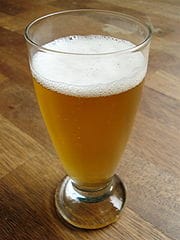Changes in the way hops are grown has led the USDA to rewrite the rules.
TakePart.com
By Twilight Greenaway
Organic hops used to be a rare crop. So rare, in fact, that the rule makers at the U.S. Department of Agriculture decided in 2007 that organic hops weren’t necessary to make certified organic beer.

Now, a mere six years later, that has all changed. As of January, every beer ingredient has to be organic to earn a brewer organic certification, and the resulting growth in the organic hops industry is a boon to farmers interested in cultivating this unusual, high-value crop. Organic hops can gross as much as $10,000 an acre, making this aromatic flavoring agent a great addition to diverse small to midsize organic farms—especially those where the farmer has already worked with orchards. To an apple farmer, for instance, hops would be a familiar crop in many ways—both are perennials (meaning they live for more than one growing season), involve trellising, and have similar harvest times.
Although the bitter, aromatic hops only account for a small percent of the total ingredients—around one pound per 32-pound barrel of organic beer—they play a crucial role in shaping the flavor. Without hops, beer would lose the bitter, tart edge that defines its flavor as much, if not more, than the particular malt it’s brewed with.
Most of today’s craft beer relies on an American-bred variety known as the Cascade hops, which Chico, CA’s Sierra Nevada Brewing Company describes this way:
Its unique pine needle, grapefruit and floral aromas were like nothing out of Europe, and the bold aromas and flavors became the flag for the new American brewing upstarts. If one ingredient can be said to start a movement, it would be the Cascade hop—the plant that built craft beer.
Like the name implies, most Cascade hops are grown in the Pacific Northwest. In fact, Washington’s Yakima Valley has become the heart of hops farming. As recently as 2010, only 100 acres of the 30,000 acres of hops in the valley were grown organically.
But according to The American Organic Hop Grower Association, the total pounds of organic hops produced by their member growers tripled last year, growing from 70,000 pounds in 2011 to 218,000 pounds in 2012. What’s even more impressive? A full 10 percent of the hops grown in the U.S. are now certified organic (around double that of the average crop).
Of course, that doesn’t mean organic hops are easy to grow. Lau Ackerman grows hops for the Sierra Nevada, a company known for its efforts toward sustainability (more than half the brewery’s energy use is accounted for with their own in-house solar panels and fuel cells, and they transport their malt by railroad to reduce emissions). The bulk of Sierra Nevada’s homegrown organic hops go to make their Estate Ale, which is sold for a limited time every autumn. “If there’s more left over, we experiment with one-offs that are mainly sold locally in Chico,” says Ackerman. But he adds that the company has always encouraged the industry to grow organic hops by purchasing them to use in their non-certified beers, simply because they, “believe in organic practices.”
Ackerman’s crops—which grow adjacent to the brewery—have been certified organic since 2009, but he hasn’t ever used synthetic pesticides or herbicides since they were planted years ago.
Hop plants, which are grown for their flowers, known as cones, are delicate and especially susceptible to extreme weather, diseases, and pests like aphids and spider mites. For these reasons, the organic version of the crop produces a lower yield than its conventional counterparts.
This perennial plant also sends long bushy tendrils up tall trellises at a rate of around 10 feet a day during peak growing season, meaning they also have an enormous hunger for nitrogen that can be hard to feed without synthetic fertilizer. Glen Fuller of Rising Sun Farm in Paonia, Colorado, plants cover crops that fix nitrogen in the soil, but he estimates that his five-acre hops field produces only “a little better than 50 percent of average yield.”
Fuller has been growing the crop for around six years and has helped a number of farmers set up similar operations around the nation, by working as a consultant and selling his rootstock. “We’re a pretty friendly, cooperative group,” he says of the other small hops growers he’s worked with.
Like many growers, Fuller—who also grows organic apples and vegetables—says he’s planning to expand his hops acreage a little in anticipation of increased demand. “Now that more breweries are going organic, and there’s more demand for organic hops, I figured we could expand a little,” he says.
Does organic beer taste better? Sierra Nevada’s Ackerman says yes, even if there is by no means a consensus in the beer-drinking world. “There can be a quality difference, just like in organic food. But it’s also hard to put a finger on it,” he says.
“It’s a little tangier, and more citrusy. People like it,” says Fuller, who likes to “sample” a local brew made with his hops at a nearby microbrewery around every other night.

